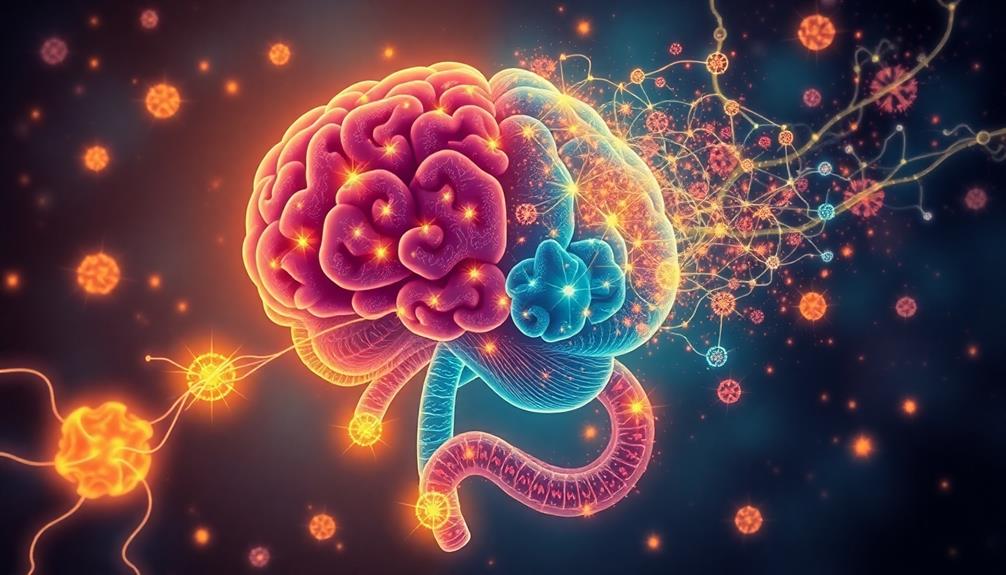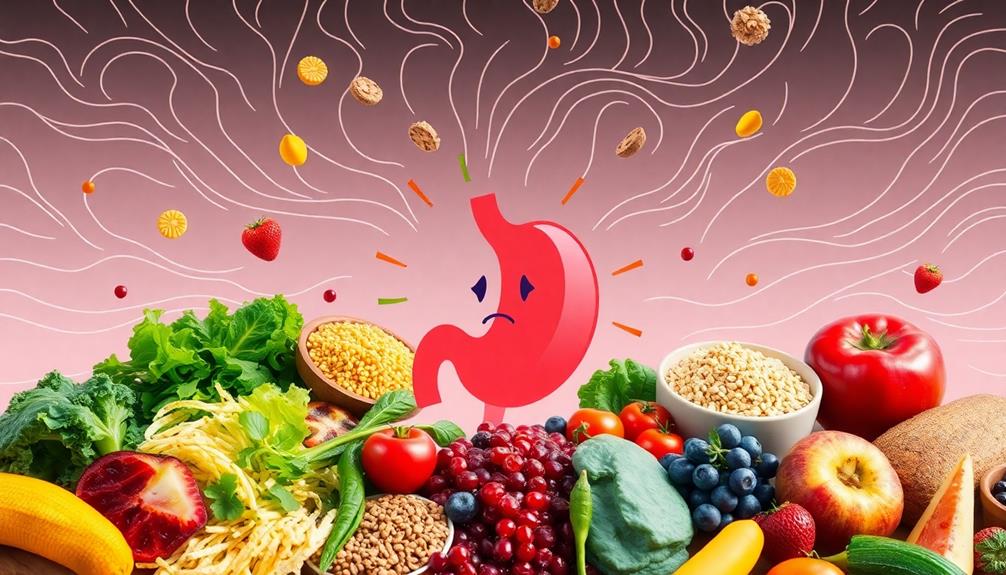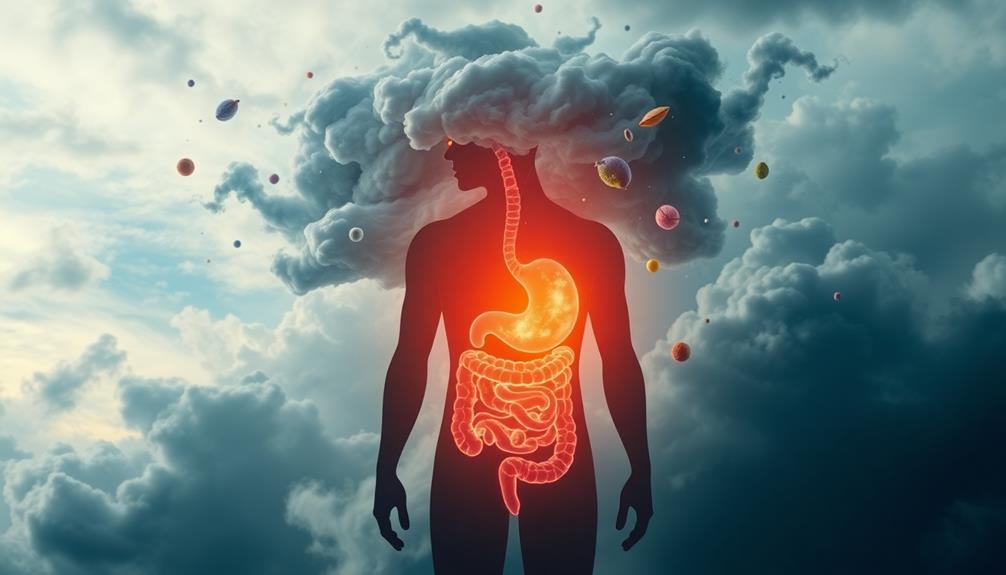Stress impacts your digestion and nutrient absorption by disrupting the gut-brain connection. When you're stressed, energy diverts away from digestion, leading to symptoms like cramping, bloating, and changes in appetite. Chronic stress increases gut permeability, which can exacerbate conditions like IBS and IBD. Elevated cortisol levels further compromise gut function, making it harder for your body to absorb nutrients effectively. This tug-of-war between survival and digestion may leave you feeling unwell. Understanding how to manage stress and its effects on your gut health could lead to significant improvements in how you feel. Explore more to enhance your well-being!
Key Takeaways
- Stress activates the sympathetic nervous system, diverting energy from digestion and causing gastrointestinal issues like cramping and bloating.
- Chronic stress increases intestinal permeability and inflammation, exacerbating conditions like IBS and IBD, which affect nutrient absorption.
- Elevated cortisol levels disrupt gut function, worsening symptoms and hindering effective nutrient uptake in individuals with existing digestive disorders.
- Emotional states linked to stress can alter gastrointestinal motility, leading to issues like diarrhea or constipation that impact nutrient absorption.
- Stress-induced eating behaviors can lead to poor nutritional choices, further compromising digestive health and nutrient absorption.
The Brain-Gut Connection

The brain's influence over your gut is profound, forming an essential connection that affects your overall digestive health. This relationship is known as the brain-gut axis, where the central nervous system communicates with the enteric nervous system, often called the "second brain."
The gut houses the highest concentration of nerves outside the brain, and it plays a significant role in regulating digestion. For instance, just as a comforting meal like Red-Braised Pork Belly can enhance your mood, stress can greatly disrupt this delicate balance.
When you experience psychological stress, it activates your sympathetic nervous system, triggering the fight-or-flight response. This process diverts energy away from digestion, increasing stomach acid production and inhibiting gastrointestinal function.
Over time, chronic stress can disrupt gut motility and heighten visceral sensitivity, leading to gastrointestinal disorders like irritable bowel syndrome (IBS) and inflammatory bowel disease (IBD).
Additionally, stress can alter gut permeability and blood flow, causing discomfort and worsening existing digestive issues. The neurotransmitter serotonin, which is notably involved in mood regulation, also influences gut health.
Recognizing the importance of managing stress is essential for maintaining a healthy brain-gut connection and ensuring effective digestive function. Prioritizing stress reduction techniques can profoundly improve your gut health and overall well-being.
Effects of Stress on Digestion

Stress can wreak havoc on your digestion, leading to a range of uncomfortable symptoms. When you experience stress, your body activates the sympathetic nervous system, triggering the fight-or-flight response. This shift diverts energy away from your digestive processes, resulting in gastrointestinal issues like cramping and bloating.
If stress becomes chronic, it can increase intestinal permeability and inflammation, contributing to conditions such as irritable bowel syndrome (IBS) and inflammatory bowel disease (IBD). Additionally, certain foods, like the comforting Mushroom Masala, can help soothe the digestive system during stressful times by offering a rich blend of spices that enhance flavor.
Elevated cortisol levels during stressful times can disrupt gut function, worsening symptoms, especially if you already have digestive disorders. You may notice changes in your appetite, feeling either nausea or loss of appetite.
Furthermore, stress can cause diarrhea or constipation, as your body prioritizes survival over digestion.
The gut houses a considerable number of nerves, more than the spinal cord, emphasizing the powerful connection between your brain and gut. This means that stress can greatly alter gastrointestinal motility and how your body perceives visceral sensations.
Stress Management Strategies

Finding effective ways to manage stress can greatly improve your digestive health. Implementing various stress management strategies can help you combat gastrointestinal problems and enhance your overall well-being.
Regular exercise is one of the most beneficial approaches; it boosts hormonal balance and releases endorphins, which naturally reduce stress while promoting better digestion. Additionally, incorporating a diet rich in fresh, nutrient-dense foods, such as those found in farm-to-table cooking, can further support digestive health during stressful times.
Incorporating relaxation techniques, such as slow, relaxed breathing, can counteract hyperventilation, easing discomfort often worsened by stress. Additionally, practices like yoga and meditation not only help lower stress levels but also facilitate better gut-brain communication.
Cognitive Behavioral Therapy (CBT) has proven effective in managing stress, allowing you to identify and change negative thought patterns. This can lead to significant improvements in gastrointestinal function and symptom relief.
Lastly, don't forget the importance of a balanced diet. Eating regular meals and staying hydrated are essential for preventing digestive issues, especially during stressful times.
Dietary Impacts on Gut Health

Your diet plays an essential role in maintaining gut health, and making informed food choices can greatly impact digestion. Incorporating a variety of ingredients, such as those found in Brazilian cuisine, can introduce unique flavors and nutrients that support digestive health.
Understanding the dietary impacts on gut health can help you manage stress levels and maintain healthy digestion. Here are three key dietary components to focus on:
- Regular Meals and Snacks: Eating consistently prevents digestive issues like IBS. Avoid letting your stomach go empty for too long, as this can lead to discomfort.
- Hydration and Fiber: Drink plenty of water and include fiber-rich foods in your meals, such as fruits and vegetables. This combination aids digestion, reduces constipation, and promotes overall gut health.
- Probiotics and Prebiotics: Incorporate foods like yogurt and fiber-rich fruits to support gut microbiota diversity. A healthy balance of gut bacteria enhances nutrient absorption and digestive function.
Additionally, consider nutritional counseling with a dietitian for personalized guidance tailored to your needs.
Keeping a daily journal to track your food intake and symptoms can also help you identify irritants, allowing you to optimize your diet for better gut health.
Making these dietary changes can greatly improve your digestion and overall well-being.
Psychological Factors in Digestion

Many people don't realize how deeply psychological factors influence digestion. Your emotional state can trigger a stress response that alters gastrointestinal motility, leading to uncomfortable symptoms like cramping, bloating, and changes in appetite. For instance, if you're feeling anxious, you might notice an increase in visceral sensitivity, making you more aware of pain and discomfort, especially if you have conditions like IBS.
Additionally, embracing a nourishing diet rich in diverse flavors, such as traditional Asian Cuisine, can provide comfort and support digestive health during stressful times.
Research shows that chronic stress can disrupt your gut microbiome, which negatively impacts nutrient absorption and overall digestive function. It's essential to recognize your emotional triggers, as they can lead to stress-induced eating behaviors that result in poor dietary choices, further exacerbating digestive issues.
One effective way to manage these psychological factors is through Cognitive Behavioral Therapy (CBT). This approach helps you address negative thought patterns related to stress, ultimately reducing anxiety and improving your digestive health.
Frequently Asked Questions
How Does Stress Affect Digestion?
Stress disrupts your digestion by triggering the fight-or-flight response, which reduces blood flow to your digestive system. This can lead to symptoms like cramping, bloating, and irregular bowel habits, making you feel uncomfortable and unwell.
How Does Stress Affect Nutrient Absorption?
Stress decreases your body's ability to absorb nutrients effectively. It disrupts enzyme production and alters gut microbiota, leading to deficiencies in essential vitamins and minerals that your body needs for ideal health and energy.
What Are Three Common Stomach Conditions That Are Affected by Stress?
When stress hits you like a thunderstorm, it can stir up three common stomach conditions: Irritable Bowel Syndrome, Gastroesophageal Reflux Disease, and Peptic Ulcers. Each can wreak havoc on your digestive peace.
How Do I Stop Stress From Affecting My Gut?
To stop stress from affecting your gut, practice regular exercise, incorporate relaxation techniques like yoga, and maintain a balanced diet. Also, track your food intake to identify triggers and adjust your habits accordingly.
Conclusion
In understanding how stress impacts digestion and nutrient absorption, you realize that your mind and gut are inextricably linked. When stress rears its head, it's like a storm cloud hovering over your digestive system, disrupting its natural rhythm. By managing stress and nurturing your gut with the right foods, you can reclaim harmony in your body. Remember, a calm mind paves the way for a thriving gut, leading to better health and vigor.










